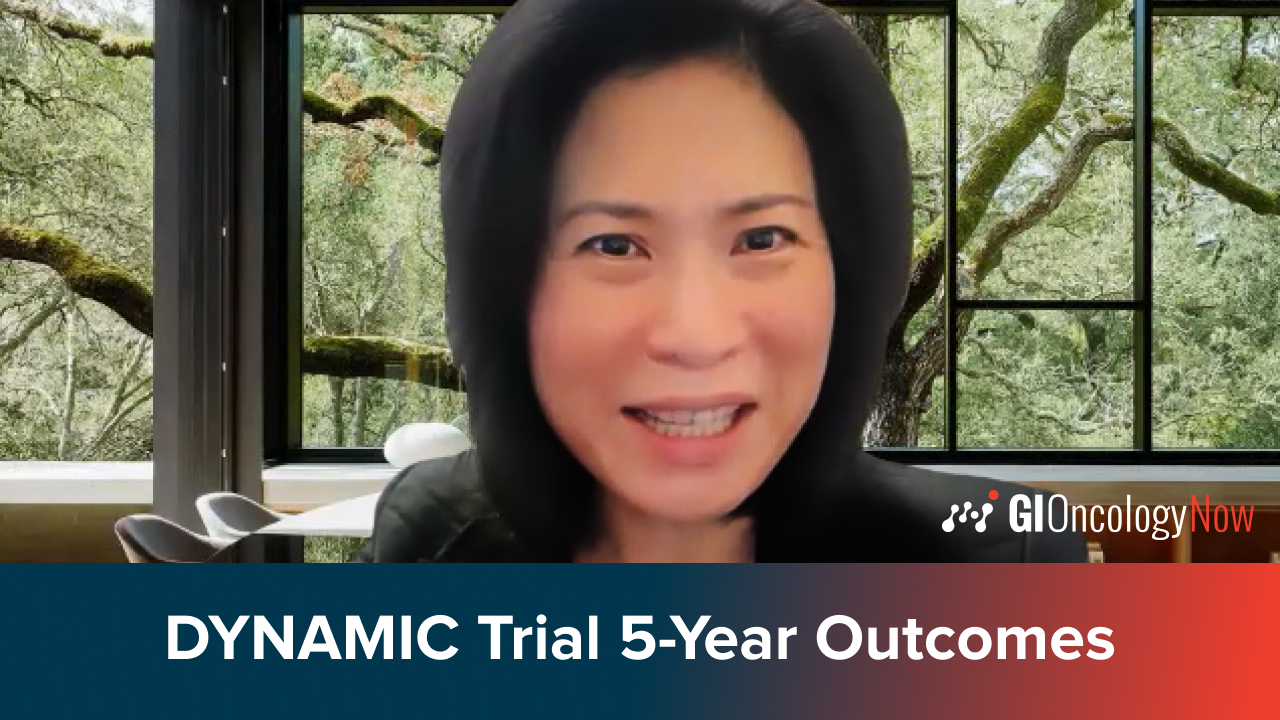
The FRESCO-2 study, published in The Lancet, showed that fruquintinib resulted in an overall survival (OS) benefit compared with placebo in patients with refractory metastatic colorectal cancer (CRC).
CRC is the third most diagnosed cancer, and nearly half of patients with CRC will develop distant metastases, with a 5-year survival rate of 15%. Standard treatments for CRC include chemotherapy and targeted therapies, as well as oral agents trifluridine/tipiracil and regorafenib, which the investigators noted “have shown incremental effects on median OS.” Thus, there is an unmet need for safe and effective therapies for refractory metastatic CRC.”
A New Treatment Option
Fruquintinib is a selective and potent oral tyrosine kinase inhibitor of vascular endothelial growth factor (VEGF) receptors 1, 2, and 3 receptors that play a key role in angiogenesis correlated with tumor growth and spread. The randomized, double-blind, placebo-controlled, multicenter, phase 3 FRESCO trial, based in China, found that fruquintinib demonstrated notable improvement with respect to both OS and progression-free survival (PFS) compared with placebo. At the time of analysis, standard treatment protocols for metastatic CRC in China were not consistent with those outside of China. Only one-third of patients in FRESCO had received previous anti-VEGF therapy, and no study participants received trifluridine/tipiracil, or regorafenib. These factors led researchers to conclude that there was an unmet need for an international study to analyze the safety and efficacy of fruquintinib in patients who had previously been treated with trifluridine/tipiracil, regorafenib, or a combination of both.
The international, randomized, double-blind, placebo-controlled, phase 3 FRESCO-2 study was conducted at 124 hospitals and cancer centers across 14 countries in North America, Europe, Asia, and Australia. The study included 691 adult patients with histologically or cytologically confirmed metastatic CRC. All patients had received current standard approved cytotoxic and targeted therapies and progressed on or were intolerant to trifluridine/tipiracil, regorafenib, or both. Between August 12, 2020, and December 2, 2021, patients were randomized 2:1 to receive either oral once-daily fruquintinib 5 mg (n=461) or placebo (n=230) on days 1 through 21 of 28-day cycles, plus best supportive care, which was determined by local practice. Treatment continued until disease progression, death, unacceptable toxicity, withdrawal of consent by the patient, discontinuation by the physician, or study completion or termination. See TABLE 1 for baseline patient characteristics.
| TABLE 1. Baseline Patient Characteristics | ||
| Fruquintinib group (n=461) |
Placebo group (n=230) |
|
| Median age, years | 64 (range, 56-70) | 64 (range, 56-69) |
| White race | 367 (80%) | 192 (83%) |
| Patients with liver metastases | 339 (74%) | 156 (68%) |
| Median number of prior therapies | 4 (range, 3-6) | 4 (range, 3-6) |
| Prior therapies VEGF inhibitor EGFR inhibitor Immune checkpoint inhibitor BRAF inhibitor |
445 (97%) 180 (39%) 21 (5%) 9 (2%) |
221 (96%) 88 (38%) 11 (5%) 7 (3%) |
| Previous trifluridine/tipiracil or regorafenib Trifluridine/tipiracil Regorafenib Both |
240 (52%) |
121 (53%) |
Stratification factors included previous trifluridine/tipiracil, regorafenib, or both; RAS mutation status; and duration of metastatic disease. The primary outcome of interest was OS, while PFS was a key secondary end point, along with objective response rate (ORR), disease control rate, duration of response, safety, and health-related quality of life.
FRESCO-2 Efficacy and Safety Outcomes
The median OS was 7.4 months (95% CI, 6.7-8.2) in the fruquintinib group versus 4.8 months in the placebo group, for an absolute difference of 2.6 months (hazard ratio, 0.66; 95% CI, 0.55-0.80; P<.0001). Kaplan-Meier analysis for OS showed an early separation of the curves that favored patients in fruquintinib group, and this separation was maintained over the study’s duration. Median PFS was 3.7 months (95% CI, 3.5-3.8) in the fruquintinib group versus 1.8 months (95% CI, 1.8-1.9) in the placebo group (P<.0001). The overall proportion of patients who were alive at 9 months was 41% (95% CI, 36-46) in the fruquintinib group versus 28% (95% CI, 22-34) in the placebo group. The ORR was 2% in the fruquintinib group compared with 0% in the placebo group. The average duration of response in the fruquintinib group was 10.7 months, and the disease control rate was 56% in the fruquintinib group compared with 16% in the placebo group.
Of the study cohort, 605 (88%) patients had disease progression or died: 392 (85%) in the fruquintinib group and 213 (93%) in the placebo group. Overall, 451 patients (99%) in the fruquintinib group and 213 (93%) in the placebo group had at least one adverse event. See TABLE 2 for the most common adverse events in each cohort.
| TABLE 2. Any-Grade Treatment-Related Adverse Events | ||
| Fruquintinib group (n=456) |
Placebo group (n=230) |
|
| Hypertension | 168 (37%) | 20 (9%) |
| Asthenia | 155 (34%) | 52 (23%) |
| Decreased appetite | 124 (27%) | 40 (17%) |
| Diarrhea | 110 (24%) | 24 (10%) |
| Hypothyroidism | 94 (21%) | 1 (<1%) |
| Fatigue | 91 (20%) | 37 (16%) |
| Hand-foot syndrome | 88 (19%) | 6 (3%) |
| Abdominal pain | 83 (18%) | 37 (16%) |
| Nausea | 79 (17%) | 42 (18%) |
| Proteinuria | 79 (17%) | 12 (5%) |
| Constipation | 79 (17%) | 22 (10%) |
Dose interruptions due to adverse events occurred in 213 patients (47%) who received fruquintinib and 61 (27%) who received placebo. Dose reductions due to adverse events occurred in 110 (24%) and 9 (4%) patients, respectively. The most common adverse events leading to dose reduction with fruquintinib were hand-foot syndrome (5%), hypertension (4%), and asthenia (4%). Overall, 93 patients (20%) who received fruquintinib and 49 (21%) who received placebo discontinued treatment due to adverse events.
“This international, phase 3 study met its primary and key secondary end points, showing significant improvements in [OS] and [PFS] with fruquintinib in a heavily pretreated patient population with refractory metastatic [CRC],” the researchers wrote. “The benefit of fruquintinib over placebo was evident by the 34% reduction in risk of death and 68% reduction in risk of disease progression or death. At 6 months, 24% of patients in the fruquintinib group versus 1% in the placebo group had [PFS]. The [OS] improvement seen with fruquintinib is further supported by the findings in the placebo group, which were similar to previous studies in metastatic CRC.”
Limitations and Conclusions
The researchers noted that the COVID-19 pandemic impeded their ability to complete blood-based circulating tumor DNA correlative analyses due to supply chain constraints. While the inability to complete the exploratory analyses prevented a deeper understanding of patients who might benefit from fruquintinib treatment, the absence of these data did not affect the primary and secondary end point analyses or overall conclusions, according to the study authors.
“Results from FRESCO-2 support fruquintinib as a new oral treatment option globally that will add to the armamentarium for patients with refractory metastatic [CRC] and will enrich the continuum of care for these patients,” the researchers concluded.
“I think [the findings] demonstrate that overall [FRESCO-2] was a positive study with regards to overall survival,” said Cathy Eng, MD, FACP, FASCO, one of the lead investigators of FRESCO-2. “[Fruquintinib] is a single agent. It does not need to be combined with another agent, which I think is helpful for patients in this setting where they’re trying to look at all their alternatives, and obviously quality of life is extremely important.”
Dr. Eng added that: “We want to continue to provide options for our patients. I think it’s important to demonstrate that these clinical trials do make a difference, and I believe that we need to continue to encourage people to participate in clinical trials moving forward.”
The study was sponsored by HUTCHMED.
Reference
Dasari A, Lonardi S, Garcia-Carbonero R, et al. Fruquintinib versus placebo in patients with refractory metastatic colorectal cancer (FRESCO-2): an international, multicentre, randomised, double-blind, phase 3 study. Lancet. 2023;402(10395):41-53. doi:10.1016/S0140-6736(23)00772-9







 © 2025 Mashup Media, LLC, a Formedics Property. All Rights Reserved.
© 2025 Mashup Media, LLC, a Formedics Property. All Rights Reserved.